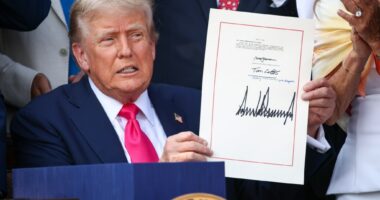Share this @internewscast.com
Representative Thomas Massie (R-KY) introduced HR 3795, the Gold Reserve Transparency Act of 2025, to authorize the first comprehensive audit of U.S. gold reserves in over 65 years and mandate follow-up audits every five years.
This breaking news, reported on X by Massie, aims to ensure transparency and accountability regarding the nation’s gold holdings. Consequently, the Gold Reserve Transparency Act 2025 addresses long-standing concerns about the security and management of U.S. gold reserves.
The proposed bill, now under the review of the Committee on Financial Services, aims to appoint the Comptroller General to manage an independent audit process. This brings significant implications that warrant thorough consideration.
I just introduced HR 3795, the Gold Reserve Transparency Act of 2025, to audit U.S. gold reserves.
Back in February, President Trump expressed a desire to visit Fort Knox to ensure the gold reserves were intact. This legislation offers the transparency that President Trump has been advocating for. pic.twitter.com/ZQTFYSX2ov
— Thomas Massie (@RepThomasMassie) June 6, 2025
HR 3795 requires the Comptroller General to retain an accredited, independent, third-party external auditor to conduct a comprehensive assay, inventory, and audit of all gold reserves within nine months of the bill’s passage, with follow-up audits scheduled every five years.
The audit will include gold in “deep storage,” evaluate physical security measures, account for encumbrances like leases or swaps over the past 50 years, detail all transactions involving gold reserves, and comprehensively account for gold held by third parties such as the Bank for International Settlements or the International Monetary Fund.
The Comptroller General must issue a public report within three months of each audit, with no redactions except for physical security details.
Additionally, the Comptroller General and the external auditor will have full access to all necessary facilities and records, enforceable by subpoena authority, and the Treasury Department must provide all relevant documents without redactions.
The implications of the Gold Reserve Transparency Act 2025 are significant. For instance, it could restore public trust in the management of U.S. gold reserves, which have not been fully audited since the Eisenhower administration.
Meanwhile, the requirement for regular audits every five years ensures ongoing oversight. Therefore, it addresses concerns about potential misuse or encumbrance of gold reserves, as raised by critics over decades.
In turn, this legislation challenges the Federal Reserve and Treasury Department to demonstrate transparency. The bill’s introduction marks a critical moment for fiscal accountability and national security.

















